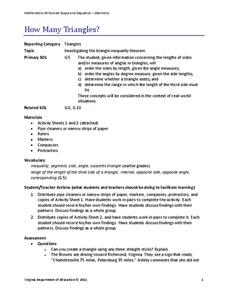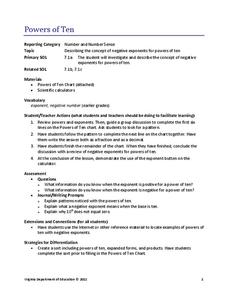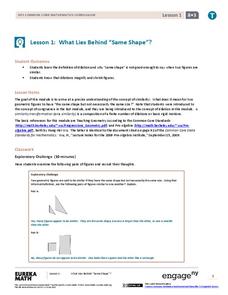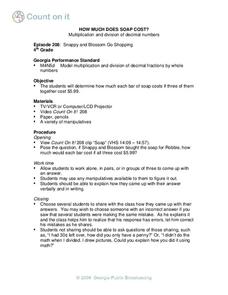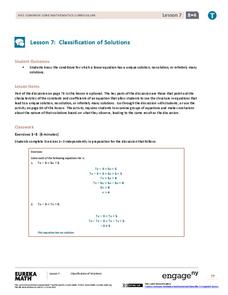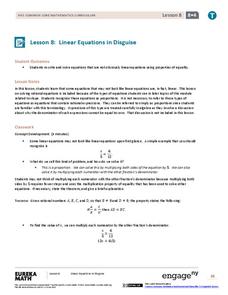Virginia Department of Education
Lines and Angles
Explore angle relationships associated with transversals. Pupils construct parallel lines with a transversal and find the measures of the angles formed. They figure out how the different angles are related before constructing...
Virginia Department of Education
How Many Triangles?
Something for young mathematicians to remember: the sum of any two sides must be greater than the third. Class members investigates the Triangle Inequality Theorem to find the relationship between the sides of a triangle. At the same...
Virginia Department of Education
Properties of Quadrilaterals
What type of quadrilateral is that? Discover the difference between the types of quadrilaterals. Small groups investigate types of quadrilaterals using geometry software to find their properties. To keep track of the different...
Virginia Department of Education
Angles, Arcs, and Segments in Circles
Investigate relationships between angles, arcs, and segments in circles. Pupils use geometry software to discover the relationships between angles, arcs, and segments associated with circles. Class members use similar triangles to...
Virginia Department of Education
Powers of Ten
Investigate negative exponents of-ten. Pupils use the pattern of increasing powers of 10 to determine negative powers of 10. The scholars write the powers in expanded and product forms and make the connection to exponents using a...
Lane Community College
Review Sheets: Introductory Physical Science
This hybrid worksheet connects mathematics to a science class. Learners practice solving problems that involve making a variety of conversions. An assortment of questions hits all the calculations needed for a middle school or beginning...
EngageNY
What Lies Behind “Same Shape”?
Develop a more precise definition of similar. The lesson begins with an informal definition of similar figures and develops the need to be more precise. The class learns about dilations and uses that knowledge to arrive at a mathematical...
EngageNY
The Distributive Property and the Products of Decimals
Make multiplication of decimals easier by applying the distributive property. Pupils investigate how they can use the distributive property to multiply decimals. After learning the strategy, they work on some practice problems at...
EngageNY
The Relationship of Addition and Subtraction
Add an outstanding resource to your repertoire. The first installment of a 36-part module looks at the relationship between addition and subtraction through an activity using tape diagrams. Pupils develop the identities w – x + x = w and...
EngageNY
Read Expressions in Which Letters Stand for Numbers III
Those key operation words sure come in handy. Groups continue their work with converting between different notations for algebraic expressions. They work in stations to write the symbolic form for given verbal phrases. This is the 17th...
Curated OER
How Much Does Soap Cost?
Explore multiplication and division using real life problems, including how to find the cost of soap per bar. Individuals or small groups work to find answers. They then share with the class how they found their answer.
EngageNY
Classification of Solutions
Is there one, none, or more? Through discussion or activity, scholars find the properties of an equation that will determine the number of solutions. They then use the properties discovered to figure out the number of solutions for a...
Common Core Sheets
Using Order of Operations
With two versions and an answer key, this order of operations worksheet is easily accessible for most learners to practice their skills.
Curated OER
Candy Machine
Using the concept of a candy vending machine, young mathematicians explore the sugar ratios found in different types of candy. Using the provided information, class members calculate and compare different ratios in order to find the...
EngageNY
Linear Equations in Disguise
In the eighth segment of a 33-part unit, learners look at equations that do not appear to be linear at first glance. The equations are proportions where the numerators and denominators may have more than one term. To round out the...
EngageNY
Populations, Samples, and Generalizing from a Sample to a Population
Determine the difference between a sample statistic and a population characteristic. Pupils learn about populations and samples in the 14th portion in a unit of 25. Individuals calculate information directly from populations called...
Other popular searches
- Math Assessment on Coins
- Elementary Math Assessments
- Math Assessment Test
- Math Assessment Fractions
- Cumulative Math Assessment
- Fitness Assessment Math
- Baseline Math Assessment
- Third Grade Math Assessment
- First Grade Math Assessment
- Grade 4 Math Assessment
- Math Assessment Questions
- Basic Math Assessment



